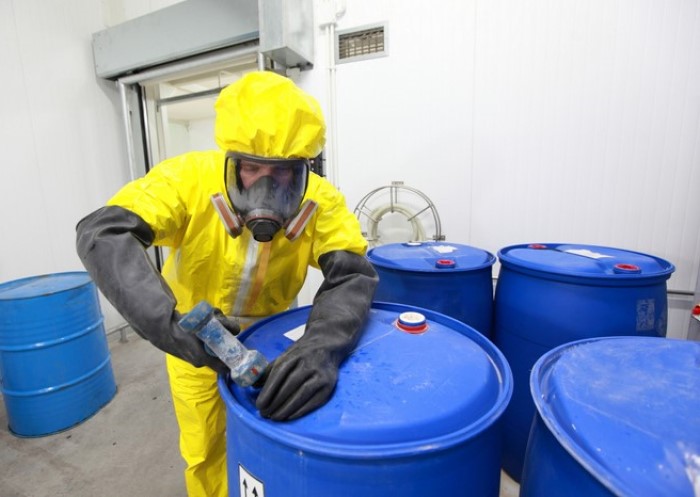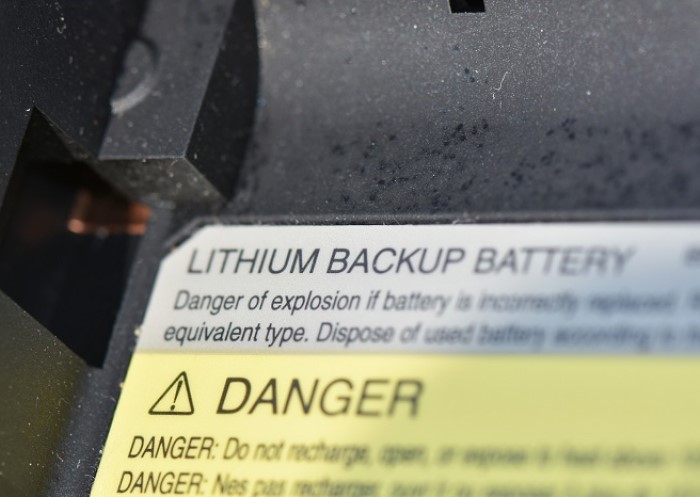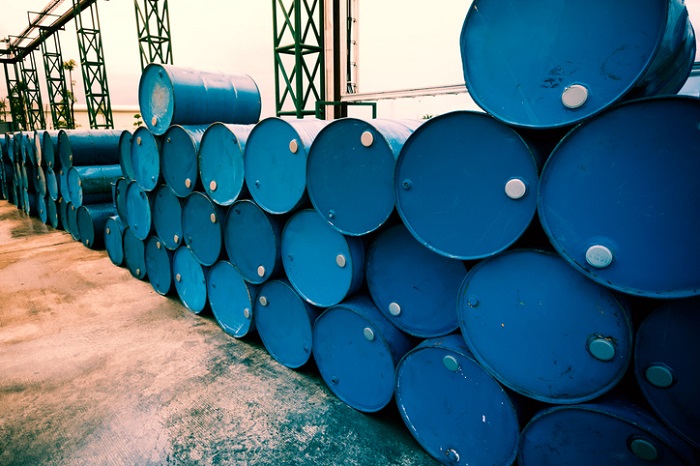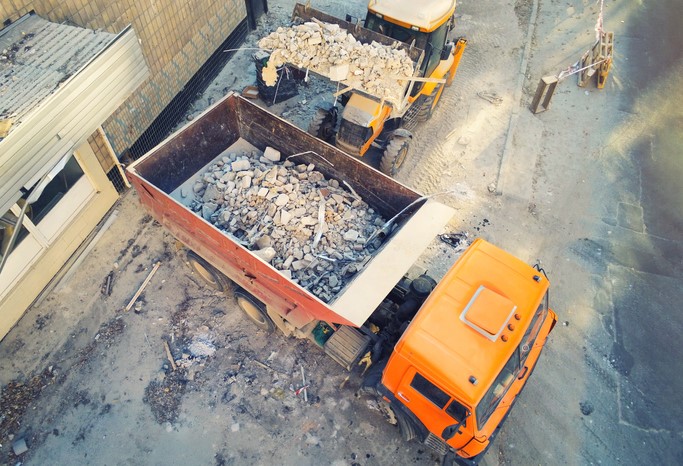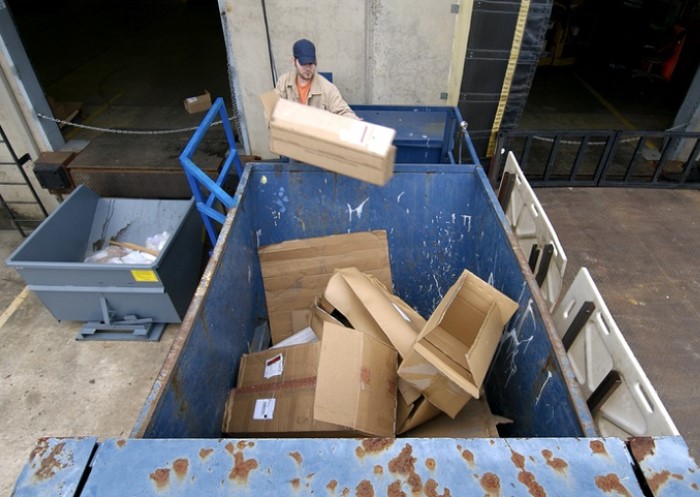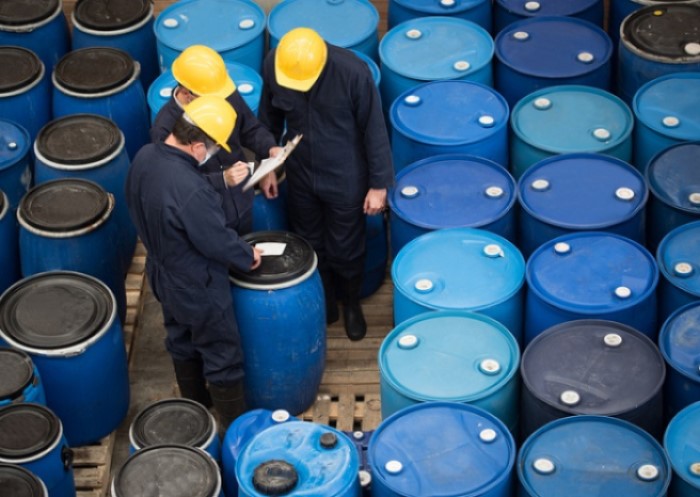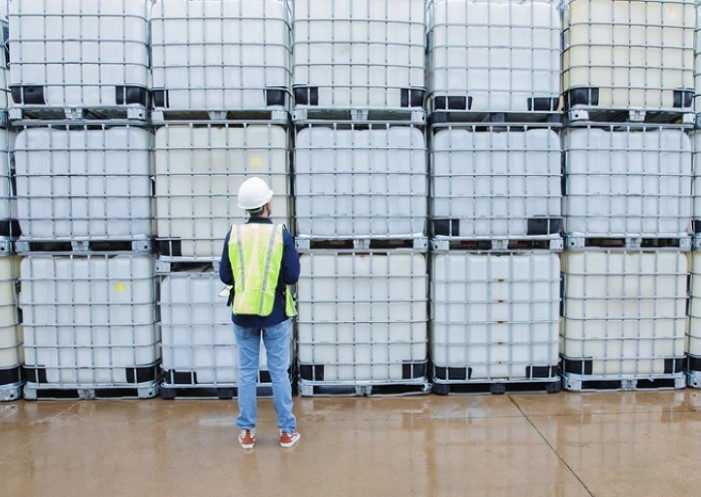Table of contents
Whether in production plants, craft enterprises or in the home, wherever chemicals are used, they must also be disposed of in accordance with local and federal regulations. Strict guidelines apply in the UK and throughout Europe regarding chemical waste disposal, and both industrial companies, as well as private households are obliged to meet these standards.
The term ‘chemicals’ refers to substances that trigger a chemical reaction through their use. While this effect is desired in the respective area of application, it can have dangerous effects in the wrong environment. For example, if chemical substances get into the groundwater. Always dispose of toxic substances via appropriate collection points or specialised disposal companies. Under no circumstances should you dispose of potentially hazardous substances via commercial or household waste.
Before chemical disposal: How to store chemicals properly
Potentially toxic substances such as acids or alkalis are found in a wide variety of products, for example in paints, varnishes, special cleaners, solvents, or chemical fertilisers. A large proportion of these require special care both when in use and during disposal. The chemical ingredients can be divided into three groups:
| Property | Example products |
|---|---|
| • Flammable and/or explosive | • Plastics • Lacquers • Solvents • Oils |
| • Solid or liquid corrosive substances | • Sodium peroxide • Chlorine • Caustic soda • Building lime • Phosphoric acid • Nitric acid • Caustic soda • Sulphur dioxide |
| • Environmentally hazardous substances | • Sulphur trioxide • Trichloromethane • Heavy metals (lead, mercury) |
It is essential to store chemicals separately from each other and from other waste products. This will prevent dangerous reactions causing smoke, fire or explosions during interim storage. In addition, you should ensure that all waste is optimally recycled, as stipulated by the Control of Substances Hazardous to Health (COSHH).
Depending on the chemical, various containers, tubs or storage cabinets are suitable for this purpose. For example, fireproof containers for highly flammable substances or collection bins for the disposal of acids and alkalis. For information on which containers are suitable for temporary storage, see the regulations from the Control of Substances Hazardous to Health (COSHH).
When working with hazardous substances, always keep organic solvents such as brush or cold cleaners, petrol, or liquid barbecue lighter sealed. Never pour them down the drain or toilet. Organic solvents evaporate very easily and pose a considerable burden to the atmosphere. Use solvent-free alternatives that you can dilute with water, such as acrylic resin-based varnish.
You should pay attention to the following
Within a business environment, you must ensure a safe storage place as well as the clear labelling of chemical waste. Make sure that the following conditions are met:
- Well ventilated space with impermeable, easy-to-clean floor covering
- If necessary, collection trays or basins for toxic liquids
- Always keep containers with organic liquids tightly closed
- Mark the room with appropriate safety instructions, warning signs and hazard symbols
- Label the chemical waste disposal containers with the appropriate hazard symbols, materials, and the official waste code according to the regulations.
Disposing of chemicals for businesses
Industrial companies or laboratories that produce large quantities of hazardous substances usually hire external service providers who specialise in the disposal of organic or inorganic laboratory chemicals and hazardous substances. These certified waste management companies usually provide the appropriate collection containers and replace them at the agreed intervals. Depending on the substance and waste code, the service provider transports the chemicals to a special incineration plant or a chemical-physical treatment centre. The service provider is responsible for disposing of the chemicals in a professional manner and taking care of the necessary documentation.
Private chemical disposal
In private households, chemical waste usually occurs only in small quantities and is therefore exempt from the strict storage and labelling regulations. Documentation of disposal is also not necessary. Nevertheless, you must ensure that hazardous substances are stored safely and cannot pose a danger. Again, always store potentially hazardous substances separately.
If you want to dispose of chemical waste privately, use collection points or recycling centres run by the municipal waste disposal company. You can find the location of your nearest chemical waste disposal site here.
For certain products, you can also take advantage of voluntary take-back offers by retailers. For example, you can hand in expired medicines at pharmacies or dispose of used oil at the manufacturer.
Which products are not allowed to be disposed of in household waste?
When disposing of hazardous chemicals produced as household waste or at a domestic level there are certain regulations you must follow. For example, you must dispose of the following products at the recycling centre or through the manufacturer:
- Batteries and rechargeable batteries
- Engine, gear, and hydraulic oil
- Brake fluid
- Plant protection products and pesticides
- Acids and alkalis
- Spray cans, e.g. paints and varnishes
- Antifreeze
- Fertilisers
- Photographic chemicals
FAQ for disposing of chemical waste
Chemicals can have hazardous properties. They can be explosive or corrosive and have properties that harm water, soil, or the air. Living organisms can also be harmed by chemicals. Incorrect storage and disposal can lead to explosions, fire or serious environmental and health damage. It is therefore essential to dispose of chemicals via appropriate collection points or specialised disposal companies and never in household waste.
The legal framework for the disposal of chemicals and other hazardous substances in the UK is provided by the following laws and ordinances:
• If you produce, transport, or receive hazardous waste you will have responsibilities under the Hazardous Waste Regulations
• Some businesses involved in waste and recycling activities may have obligations under REACH, especially where waste substances are being recovered for re-use.
• If your business works with hazardous materials, then you will need to ensure you have suitable storage in line with the COSHH regulations.
Chemicals or chemical ingredients can be divided into three groups for this purpose:
• Flammable and/or explosive chemicals: e.g. plastics, paints, solvents, oils
• Solid or liquid corrosive substances: e.g. sodium peroxide, chlorine, caustic soda, building lime, phosphoric acid, nitric acid, caustic soda, sulphur dioxide
• Environmentally hazardous substances: e.g. sulphur trioxide, trichloromethane, heavy metals such as lead or mercury.
Depending on what the substance is and in what quantity, you have various options for disposal. In all cases, you must keep chemicals separate from each other and separate from other waste.
For production facilities and larger quantities of toxic substances you may need to hire an external service provider who will ensure proper disposal and provide complete documentation.
As a private household, you have the option of disposing of your chemicals at collection points or recycling centres. It may also be possible for the manufacturer to take back the chemicals, depending on the products and how they have been used.
Certain household products need to be disposed of in the correct way. For example, you must dispose of the following products at a recycling centre:
• Batteries and rechargeable batteries
• Engine, gear, and hydraulic oil
• Brake fluid
• Plant protection products and pesticides
• Acids and alkalis
• Spray cans, e.g. paints and varnishes
• Antifreeze
• Fertilisers
• Photographic chemicals
Please note: The regulations mentioned above represent only a selection of the most important legal requirements. Please refer to the listed organisations and directives for more detailed information. If in any doubt, consult experts or contact the relevant regulatory authorities.
Image source:
© gettyimages.de – endopack

